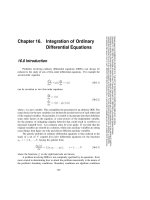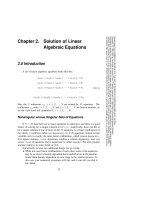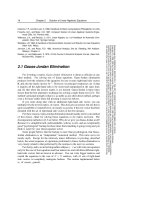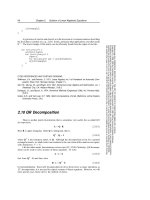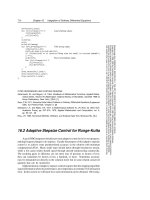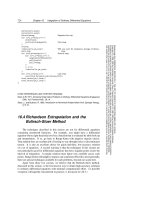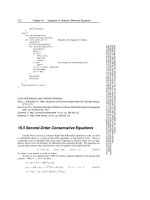Tài liệu Safety Of Life At Sea - Part 1 pdf
Bạn đang xem bản rút gọn của tài liệu. Xem và tải ngay bản đầy đủ của tài liệu tại đây (226.91 KB, 10 trang )
2-1
Safety
Of
Life
At
Sea
2-2
Introduction and history
The SOLAS Convention in its successive
forms is generally regarded as the most
important of all international treaties
concerning the safety of merchant ships.
The first version was adopted in 1914, in
response to the Titanic disaster, the
second in 1929, the third in 1948 and the
fourth in 1960.
2-3
Introduction and history
The 1960 Convention - which was adopted
on 17 June 1960 and entered into force on
26 May 1965 - was the first major task for
IMO after the Organization's creation and it
represented a considerable step forward in
modernizing regulations and in keeping
pace with technical developments in the
shipping industry.
2-4
Introduction and history
The intention was to keep the Convention
up to date by periodic amendments but in
practice the amendments procedure
incorporated proved to be very slow.
It became clear that it would be impossible
to secure the entry into force of
amendments within a reasonable period of
time.
2-5
Introduction and history
As a result, a completely new Convention
was adopted in 1974 which included not
only the amendments agreed up until that
date but a new amendment procedure -
the tacit acceptance procedure - designed
to ensure that changes could be made
within a specified (and acceptably short)
period of time.
2-6
Introduction and history
Instead of requiring that an amendment
shall enter into force after being accepted
by, for example, two thirds of the Parties,
the tacit acceptance procedure provides
that an amendment shall enter into force
on a specified date unless, before that
date, objections to the amendment are
received from an agreed number of
Parties.
2-7
Introduction and history
As a result the 1974 Convention has been
updated and amended on numerous
occasions.
The Convention in force today is
sometimes referred to as SOLAS, 1974, as
amended.
2-8
Amendment procedure
Amendments proposed by a Contracting
Government are circulated at least six
months before consideration by the
Maritime Safety Committee (MSC) - which
may refer discussions to one or more IMO
Sub-Committees - and amendments are
adopted by a two-thirds majority of
Contracting Governments present and
voting in the MSC.
2-9
Amendment procedure
Contracting Governments of SOLAS,
whether or not Members of IMO are
entitled to participate in the consideration
of amendments in the so-called "expanded
MSC“.
2-10
Amendment procedure
A Conference of Contracting Governments
is called when a Contracting Government
requests the holding of a Conference and
at least one-third of Contracting
Governments agree to hold the
Conference.
Amendments are adopted by a two-thirds
majority of Contracting Governments
present and voting.
2-11
Amendment procedure
In the case of both a Conference and the
expanded MSC, amendments (other than
to Chapter I) are deemed to have been
accepted at the end of a set period of time
following communication of the adopted
amendments to Contracting Governments,
unless a specified number of Contracting
Governments object.
2-12
Amendment procedure
The length of time from communication of
amendments to deemed acceptance is set
at two years unless another period of time
- which must not be less than one year - is
determined by two-thirds of Contracting
Governments at the time of adoption.
Amendments to Chapter I are deemed
accepted after positive acceptance by two-
thirds of Contracting Governments.
2-13
Amendment procedure
Amendments enter into force six months
after their deemed acceptance.
The minimum length of time from
circulation of proposed amendments
through entry into force is 24 months -
circulation: six months, adoption to
deemed acceptance date: 12 months
minimum; deemed acceptance to entry
into force: six months.
2-14
Amendment procedure
However, a resolution adopted in 1994
makes provision for an accelerated
amendment procedure to be used in
exceptional circumstances - allowing for
the length of time from communication of
amendments to deemed acceptance to be
cut to six months in exceptional
circumstances and when this is decided by
a Conference.
2-15
Amendment procedure
In practice to date, the expanded MSC has
adopted most amendments to SOLAS,
while Conferences have been held on
several occasions - notably to adopt whole
new Chapters to SOLAS or to adopt
amendments proposed in response to a
specific incident.
2-16
Technical provisions
The main objective of the SOLAS
Convention is to specify minimum
standards for the construction, equipment
and operation of ships, compatible with
their safety.
Flag States are responsible for ensuring
that ships under their flag comply with its
requirements, and a number of certificates
are prescribed in the Convention as proof
that this has been done.
2-17
Technical provisions
Control provisions also allow Contracting
Governments to inspect ships of other
Contracting States if there are clear
grounds for believing that the ship and its
equipment do not substantially comply
with the requirements of the Convention -
this procedure is known as port State
control.
2-18
Technical provisions
The current SOLAS Convention includes
Articles setting out general obligations,
amendment procedure and so on, followed
by an Annex divided into 12 Chapters.
2-19
Any Questions?
2-20
Thank you

